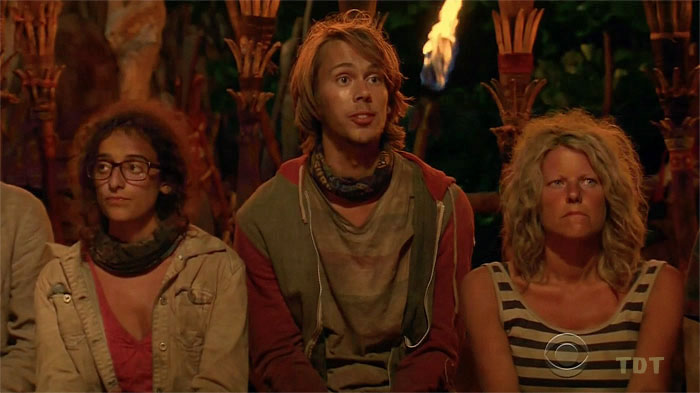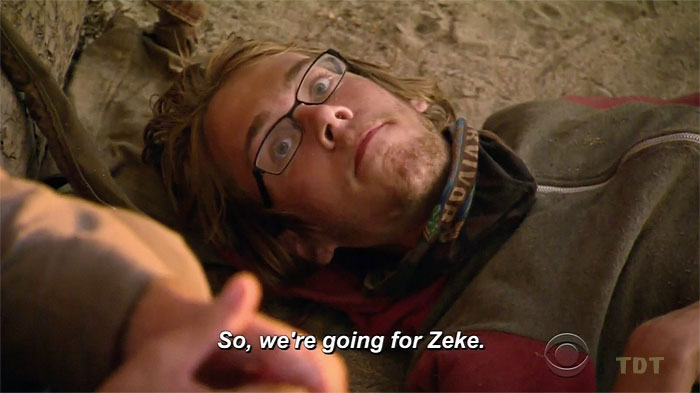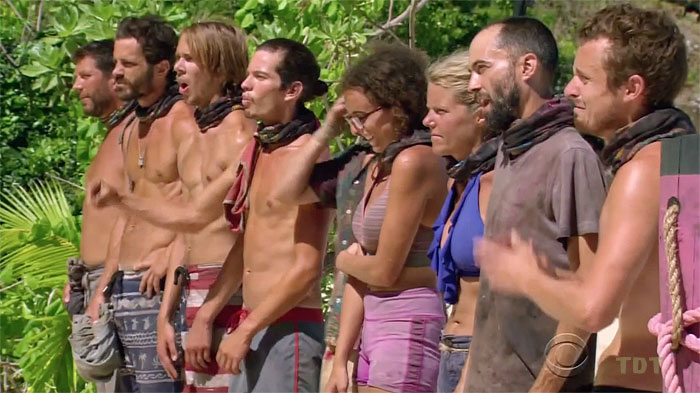

Well, I’ve been waiting a while for this one. In a season dubbed Millennials vs. Gen X, it felt like only a matter of time before some truly generation-specific stereotypical behavior happened.
I waited. I waited some more. I dismissed Taylor as, to quote Andy Baker, a “moron” and not a generational avatar. I waited more.
Then Will happened.

For about the last nine months or so, I’ve been working on a project with some friends at other universities that seeks to measure some of the effects of what scholars have called “trophy culture.” Now, I’ve mentioned that phrase here this season and, obviously, castaways in Fiji have been primed by producers to talk about millennials as folks who grew up always receiving a trophy for participation.
The concept of trophy culture evolved from a 1990s trend called the self-esteem movement. Basically, beginning in the mid 1990s, according to researchers, educators assumed that by bestowing rewards on young students, their self-esteem would increase and subsequently this would lead to more success. Despite exactly zero evidence that suggests self-esteem correlates with better grades or increased performance, educators continued to believe that by doing things like giving every Little League player a trophy, kids would become more confident and just better, I guess.
Of course, that’s not how it works.
Instead, researchers have found that trophy culture results in a generation of students who believe themselves to be “above average,” regardless of whether they actually deserve that label. It also led to a generation with more anxiety issues than ever before. Fundamentally, trophy culture continues to create students who are unable to deal with negative consequences, who have become risk averse and cannot psychologically recover when things do not go their way.
And, of course, this brings us to Will. Oh, Will. Let me say I could not have done what he’s doing at 18. At this point this season, Will’s basically played a conservative, decent game, one that would normally result in a nice sixth place finish.
But, gosh, Will deserves to win, don’t you know?

Will, unfortunately, is at the perfect age to feel the negative effects of trophy culture. You see, while some folks in their mid to late 20s probably saw some of the self-esteem movement’s processes, Will’s generation grew up with every facet. Pardon this overly general stereotype, but he’s been told since birth he was special and can do anything he wants. Like win Survivor.
Even though the game isn’t coming to him, Will thinks it should. When he’s not getting the credit he believes he deserves, instead of working with what the game throws at him, Will whines and tells us he’s going to make a Big Move™ and get the respect he so clearly deserves.
And that sentiment so clearly led to Will wanting to turn on his alliance for literally no reason. Even if his move worked, what happens? The rest of David’s alliance boots Will at the moment they no longer need him. Heck, Will never even asked for nominal promises from David’s alliance. Such a bad move.
But, gosh darn it, Will deserves a trophy. And $1 million. And the title of “sole survivor.”
And now let’s talk about the players left in the game.
Vinaka

- 1. Sunday — I’m writing this column on a Sunday while the greatest human being to ever walk on chalk-filled grass gets ready to set a major record. That’s the only “game” and a “Sunday” that I think are connected. OK, I admit, that was a bad joke. I just don’t think Sunday holds much of a chance to win, even though she’s probably being underrated quite a bit. Sorry Sunday.
- 2. Will — When Reagan started lying about "welfare queens” so he could shape public opinion, that was a Big Move™. When Jesus refused to tell Pilate what he wanted to hear, that was a Big Move™. Will flipping on his alliance? Not so much.
- 3. Bret — I think Bret’s the next castaway arriving at Ponderosa. In fact, since Bret’s a little more than a handful of years older than me, and he’s from New England, he might remember the horrid, pre-Golden Corral chain of buffets called Ponderosa. That might make him happy. I’m rambling now, but I have nothing to say about Bret. During the mid-season episodes, I thought he was playing a very underrated game, but his outburst at tribal a week ago kind of killed that.
- 4. Hannah — I’m rooting for Hannah, but her edit screams “no votes at tribal.” I’ve enjoyed the way she’s gone from a complete nonfactor – seemingly – to someone who’s clearly driving some strategy. But, it’s not in the cards for Hannah. She could be a two-time player some time, though.
- 5. Adam — Well, Adam sure received a Winner’s Edit™ this week, but I still don’t see it happening for him. Playing that hidden idol is going to hurt, I think. When the main alliance of Ken, David, Adam and Hannah need to vote out one of their own after – prediction alert! – Jay wins immunity at final five, Adam’s the one hitting the showers.
- 6. Ken — Last week I mentioned how if you watch closely, it looks like Ken is playing a subtly good game. Man, how stupid do I look now? All our original guesses about Ken seem true: He’s not much of a player. I honestly can’t remember such a bad play as the one Ken made this episode. Can anyone remember a recent move you’d consider just as bad? Let’s talk in the comments about that.
- 7. Jay — I know that David is the odds-on favorite to take this home (and I’ll talk about him in a second), but I’ve become convinced Jay’s playing the best game out there. I questioned his Michaela decision, but it looks like it was the right one. The way he’s held onto the idol and maneuvered himself into a decent position, well, it’s impressive.
- 8. David — This must be David’s game to lose right now, right? We’ve seen castaways talk openly about him being a leader and a clear threat. We know Zeke is now at Ponderosa talking about David being in on everything. He’s not a challenge threat, but can point to an immunity win. And he’s seemingly in control right now. I feel like he needs to win.
Say what you will about a season with a ton of deceptively bad play, but this 33rd season of Survivor continues to be quite the ride. Heck, I’ve been a little hesitant since the beginning to embrace some crappy play, but now I’m all in. Anyone, theoretically (not thinking about edit), could win the game at this point. Well, not Will. I’m predicting a Will and Bret boot off this week. Let’s see.
 Pat Ferrucci started watching Survivor when Episode Two of Borneo first aired. He's seen every episode since. Besides recapping here, he'll be live-tweeting this season from the Mountain Time Zone. Why? Because nobody cares about the Mountain Time Zone except when they want to ski. Follow him @patferrucci for Survivor stuff and tweets about anything and everything that enters his feeble mind.
Pat Ferrucci started watching Survivor when Episode Two of Borneo first aired. He's seen every episode since. Besides recapping here, he'll be live-tweeting this season from the Mountain Time Zone. Why? Because nobody cares about the Mountain Time Zone except when they want to ski. Follow him @patferrucci for Survivor stuff and tweets about anything and everything that enters his feeble mind.
- Index of articles
- Cast preview: And the winner? I don't know?
- Ep.1: All about the power of the prime
- Ep.2: Michelle guides the organism
- Ep.3: Paul's poorly framed response sinks him
- Ep.4: Dissonance dismisses silence
- Ep.5: David continues forcing others to innovate
- Ep.6: Figgy sees selectively, gets the boot
- Ep.7: Michaela gets dysfunctional and gets dys-boot
- Ep.8: How the castaways stack up post-merge
- Eps.10-11: Jessica's dismissal just part of the agenda
- Ep.12: Will seeks his trophy, Zeke hits the road
- Ep.13: Who holds the most finale power?
- Pre-Ep.14: Jury jeopardy